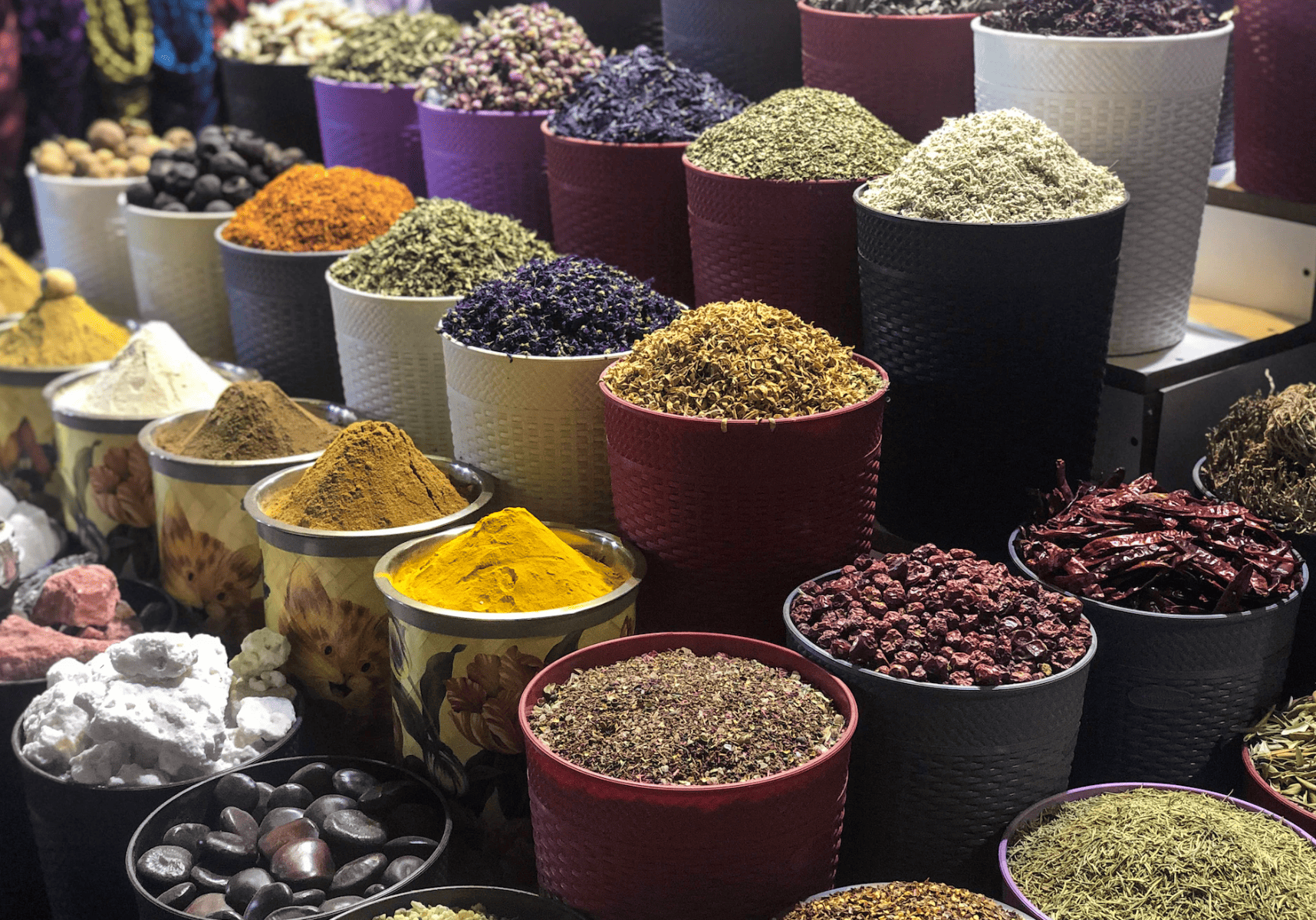
Ayurveda’s Favourite 5 Herbs to Support Digestion
Ayurvedic Wisdom on Enhancing Digestion and Well-being - By Joanna Webber
Reading time: 4 minutes
Ayurveda considers good digestion to be at the heart of health and healing. These five common spices have been used for thousands of years to relieve common issues such as bloating, indigestion and constipation.
Humans have been trading spices since Neolithic times. Indeed, ginger was once the most valuable natural commodity in human history. The dried root was once worth more than its weight in gold! Spices have been so highly valued in history because they not only make food taste better but increases its digestibility.
Ayurveda has a unique way of looking at nutrition in dividing food into six tastes: sweet, sour, salty, pungent, bitter, and astringent. Each of these has a unique effect on our mind-body physiology. By having the right balance of each taste, we are nourished and feel completely satisfied. If one or more of the tastes are missing however, we may feel full but unsatisfied and snack two hours later. We tend to favour the sweet, sour, and salty tastes while neglecting the pungent, bitter, and astringent tastes.
Through their pungent and bitter taste, spices kindle the digestive fire. This means digestive power increases which shows as a keener appetite, better ability to breakdown and absorb nutrients and increased ability to effectively excrete waste products. All in all, this means we are better nourished and free from toxins. Growing research supports Ayurveda’s view in showing spices are rich in polyphenols with powerful antioxidant and anti-inflammatory effects. Many spices are also being shown to have a prebiotic effect too.
Ginger has been found to significantly promote the growth of good bacteria, while inhibiting bad bacteria. It is likely that the positive digestive and overall health benefits of many spices are due directly to their effects on the gut microbiome.
Here are Ayurveda’s favourite herbs which work gently but powerfully to help enhance your digestion:
Coriander
Coriander is one of the cooler digestive spices, but it still balances all three Doshas (Ayurveda’s mind body types). Astringent, bitter and sweet, the leaves are more cooling (ideal for Pitta) and the seeds more warming (best for Vata and Kapha). Coriander is a wonderful remedy for helping to clear irritating heat and toxins from the body, and it is a natural diuretic. For example, the seeds can be used to help with heartburn.
Taken as a cold infusion it eases stomach ache, indigestion, diarrhoea, nausea, and urinary tract infections. The leaves are used to help reduce allergies and clear toxins. Made into a paste, the leaves can also be used externally to treat conjunctivitis and allergies.
Cardamom
This pungent and sweet member of the ginger family has light drying qualities that help balance all three Doshas. Ayurvedic texts celebrated its ability to make foods easier to digest and enhance the taste of most ordinary foods. Cardamom always tastes best when the pod is lightly crushed.
The seeds contained inside are great to chew throughout the day to help digestion and keep your mind awake. Chewing seeds is also a natural way to suppress nicotine cravings. It is used as an antidote to the heavy quality of dairy products and sweet foods.
When cooked into your food, it balances excess mucus, gas and bloating in the stomach and small intestine. It also helps neutralise the stimulating effects of caffeine, allowing tea or coffee to provide a boost without taxing the nervous system. Drinking cardamom tea also eases stomach ache and travel sickness.
Cumin
Known as Jiraka, meaning ‘digestive spice’ this slightly warming, aromatic and pungent spice also balances Vata and Kapha Doshas, but can be a little heating for Pitta in excess. It helps to stop intestinal spasms, remove toxins, and awaken the mind. It increases the digestive fire of each of the seven tissues recognised by Ayurveda so can be considered the most powerful of the digestive spices. It has a strong taste and while very effective alone, also goes well with the other four spices for reducing gas and bloating.
Cooking with cumin, or simply chewing the seeds after a meal aids relieves indigestion, gas, and bloating. Its especially useful if you eat wheat as it helps to break down this hard to digest grain, so why not add a teaspoon or two to each loaf if you bake at home.
Fennel
This sweet seed is warming, balancing Vata and Kapha and building digestive strength. In fact, it is one of the best herbs for digestion, as it strengthens the digestive fire without aggravating pitta. It helps with cramps, nausea and excess flatulence. Its aromatic essential oils help lighten digestion with an energetic action of spreading and moves outwards, thus preventing stagnation in the abdomen and chest.
Fennel tea is an ideal way to benefit, useful for children’s digestive colic and encouraging the flow of breastmilk. Simply chew some seeds after a meal, as a gentle laxative, diuretic, to cleanse the digestive tract of toxins and freshen the breath.
Ginger
Ginger is called ‘the universal medicine’ for good reason. Spicy, sweet, warming and light, ginger reduces Vata and Kapha but may increase Pitta in excess. Its digestive benefits are legendary in its power to increase the digestive fire and the secretion of digestive enzymes. It is useful for keeping the digestive system clean by preventing nausea (morning sickness, post-operative and travel sickness), flatulence, griping and sluggish digestion.
Its the classic kindling to start the digestive fire in the stomach. So, enjoy drinking fresh ginger tea throughout the day. A slice of ginger root sprinkled with lemon juice and a pinch of salt is also a good way to kick start your digestive enzymes before a meal.
Chewing a handful of cumin, fennel, cardamom, and coriander seeds after a meal is still a common practice in India for good reason, reflecting just how useful using these digestive spices daily can be. They really do make food easier to digest and absorb but do try to use herbs within their use by date. Why not have a spring clean of your kitchen spice rack every year to ensure you have fresh herbs full of Prana (life force)?







